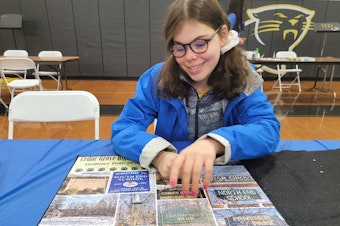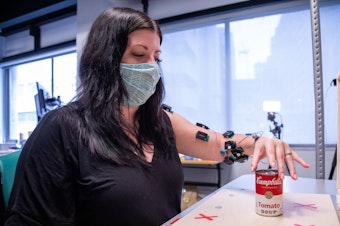Jon Hamilton
Stories
-

Meet the 'glass-half-full girl' whose brain rewired after losing a hemisphere
Mora Leeb was 9 months old when surgeons removed half her brain. Now 15, she plays soccer and tells jokes. Scientists say Mora is an extreme example of a process known as brain plasticity.
-

Spinal stimulation can improve arm and hand movement years after a stroke
Two stroke patients regained control of a disabled arm and hand after researchers delivered electrical stimulation to their spines, paving the way toward a medical device that could aid movement.
-
Robots and lasers are helping doctors treat severe epilepsy
A man wracked with uncontrolled epileptic seizures so violent that they fractured his spine sought surgery, but was turned down. Ten years later, advances in robots and lasers have finally helped him.
-

Prairie voles can find love without the 'love hormone' oxytocin, study finds
The hormone oxytocin plays a key role in long-term relationships. But a study of prairie voles finds that the animals mate for life even without help from the "love hormone."
-

FDA approves Alzheimer's drug that appears to modestly slow disease
An Alzheimer's drug that removes the substance amyloid from the brain has received a conditional approval from the FDA. A large study found the drug decreased the loss of thinking and memory by 27%.
-
Encore: Is lecanemab the Alzheimer's drug that will finally make a difference?
Researchers say the experimental Alzheimer's drug Lecanemab represents an important advance and is likely to get FDA approval in 2023, despite some safety concerns.
-

Is lecanemab the Alzheimer's drug that will finally make a difference?
The experimental drug lecanemab was able to slow down Alzheimer's in a large study. Many researchers think the drug will become the first to help large numbers of patients.
-

Study: Alzheimer's drug shows modest success slowing declines in memory, thinking
In a large study, the experimental Alzheimer's drug lecanemab reduced the rate of cognitive decline by 27 percent in people in the early stages of the disease.
-

Brain cells in a lab dish learn to play Pong — and offer a window onto intelligence
A dish of brain cells learned to play the 1970s video game Pong. The research could help computers become more intelligent
-

These LSD-based drugs seem to help mice with anxiety and depression — without the trip
Scientists have made a drug based on LSD that seems to fight depression without producing a psychedelic experience.